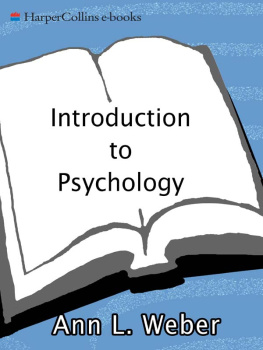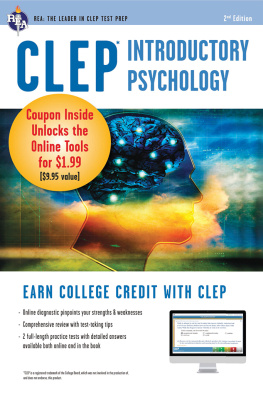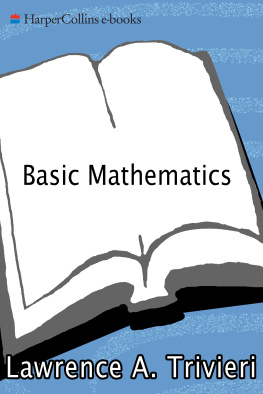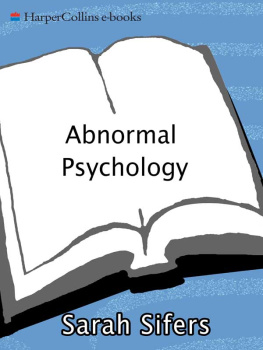If you were to meet a psychologist, you may expect him or her to either tell me what youre thinking, look at you and identify your personality traits, or interpret the dream you had last night. Yes, some psychologists do indeed study topics such as these. However, you may be surprised (even disappointed?) to find out that many psychologists only study the method you use to make a decision, the path through the brain that visual information travels en route to perceiving a face, the impact on your behavior of an observing crowd, or your ability (or struggles) to learn a second language. Whereas the purview of physics or chemistry is well defined and generally understood by most people, the same is not often said about psychology. Psychology, the science of behavior and mental processes, is not even so much a single discipline as it is a spirit common to many different fields of study; it bonds together the other social sciences: sociology, anthropology, economics, and political science. There are psychological aspects to history, art, music, and how they are experienced. Psychology emerges from the natural sciences and illuminates how they are understood; it is a central concern of much of philosophy and theology. It crosses cultures and spans millenniathe first humans undoubtedly wondered about one anothers behavior, and may well have wondered about the very process of wondering.
As an outline text, this book was based on the excellent work of other scholars whose introductory psychology texts deserve careful appreciation. This book was not written to stand alone, although it should serve as a useful and concise review for an experienced psychology student. It is written to be a comprehensive summary of the highlights most often covered in a typical introductory course in psychology. As such, it will be a helpful supplement to any recent introductory text, especially in an active studying program that involves writing and discussing ideas with others. It is assumed that the reader will consult another source if more detailed coverage of specific topics is desired.
Revisions and Updates to the 2nd Edition
This edition retains some of the contentnot to mention the spiritof the 1st Edition. However, there is a substantial proportion of new material, and some significant changes and revisions to mention as well. Nearly fifteen years have passed since the 1st Edition, and substantial progress in a number of areas is reflected in this edition. For example, the growing interest and importance of biopsychology and neuroscience warrants the space devoted in this edition to a survey of imaging techniques, and to behavioral genetics. Emerging themes in modern psychology have also been incorporated, such as the appreciation of multiple biological and environmental influences on most psychological phenomena, and the importance of studying and considering these phenomena across the life span and across diverse cultures. The chapter organization has been restructured for this edition to coincide largely with the most recent outline for the College Boards Advanced Placement (AP) examination in psychology. Outdated (or now-auxiliary) terms and concepts have been removed or replaced, and the suggested readings have been updated as well. A key new feature of this edition is the section at the end of each chapter that provides review questions (both multiple choice and short essay).
Tips for Reading, Study, and Critical Thinking
We who teach psychology courses have found that successful students tend to follow a few general strategies. These ideas are summarized as follows.
First, it is important to understand the concepts not just by memorizing definitions, but by thinking about how the concepts are applied. For example, beyond memorizing what a specific neuroimaging technique or research design is, you should understand its advantages and disadvantages, or in what situations it is best applied.
Second, you will gain the most out of the material presented in this book if you can think about how to integrate ideas by drawing connections across chapters. How did the history of the general atmosphere of psychology contribute to the approaches to treating psychological disorders? How can principles of learning be applied to understanding social phenomena? What role do certain biological processes play in development and the expression of various behaviors?
Third, we mention some of the pioneersas well as notable contemporariesin the respective fields of each chapter. It is important that you recognize these names and associate them with the theories, concepts, or developments for which they are responsible. Oftentimes, important ideas are referred to by the name of their originator, rather than by some other label. Try not to gloss over the names as irrelevant or secondaryeach good idea is the result of somebodys hard work!
Finally, and most important, you should never assume that what you read in the following pages is the definitive answer to any question, the best method to study a certain behavior, or the end of the story concerning any debate. Like any good science, psychology is dynamic, and what may be todays accepted wisdom could very easily become pass folklore tomorrow. Instead, seek out the latest information on any topic in which you are interested, to get an appreciation for the state of the art. The best teachers empower students to learn; the best texts equip the student to ask questions, to look for more. This review text is a step in that direction.
Acknowledgments
From Joseph:
I would like to thank Jerry Busemeyer for rescuing me from the real world and providing me with a better graduate education and experience than I could have imagined; without him I can certainly say I would not be where I am today. I would also like to thank my wife, Jeane, for her support and patience. She is more delighted than I to see this project come to fruition, such that she no longer has to compete with the book for my attention.
I would like to thank Fred Grayson for providing me with the opportunity to write this revision, trusting my professional facility, and putting up with my preoccupations and general flakiness. Due credit should also be given to Dr. Kevin Filter and other support personnel. I also would like to acknowledge the work of Daniel DeCaro, who researched and compiled an excellent bibliography as well as the glossary.
Psychology: History and Approaches
T he term psychology was first coined in sixteenth-century Germany as a combination of two Greek root words: psyche (soul or mind) and logos (study). Its original use suggested the study of the mind, something as old as the human race itself. In recent centuries, this interest in human nature has been honed into a systematic discipline. Today, psychology is defined as the science of behavior and mental processes, with the goal of understanding, predicting, and controlling behavior and mental processes. There are many different approaches toward psychological science; each approach focuses on particular means and methods to achieve these goals. Also, the scope of psychology includes many different fields, distinguished by interest in different psychological processes, different populations, and different levels of analysis.
Psychology has a long past, but a short history.
Herman Ebbinghaus (18501909), pioneer of memory research
 ROOTS OF PSYCHOLOGY
ROOTS OF PSYCHOLOGY
Psychology has long been a common human interest, but it has been considered a formal scientific discipline only since the late nineteenth century. Several perspectives and disciplines contributed to the origin of psychology as a science. Most notably, these include early physiological and philosophical perspectives.














 ROOTS OF PSYCHOLOGY
ROOTS OF PSYCHOLOGY